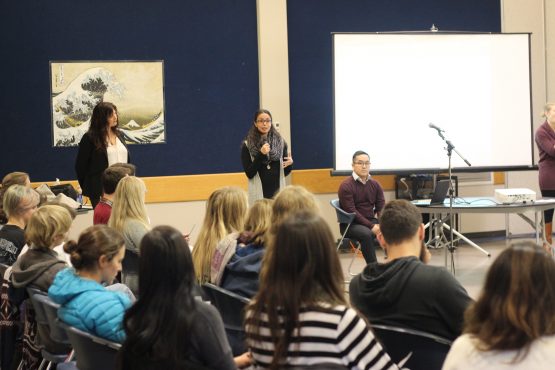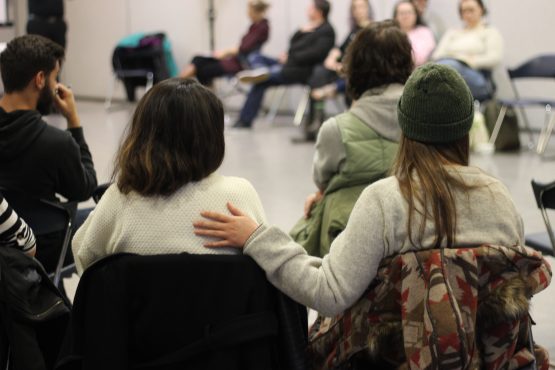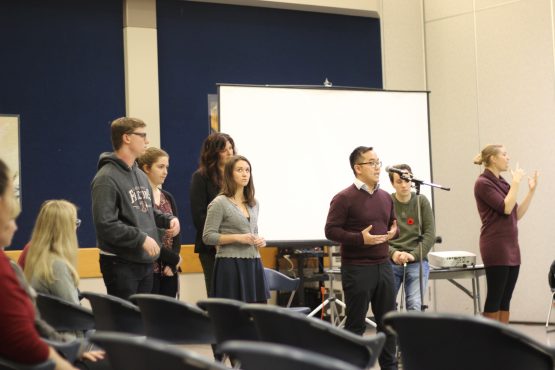Room agrees referendum needed to fix health care plan
It was an emotional evening for those gathered in the Michele Pujol room on Thursday, Nov. 9, though emotions varied between each party in attendance.
Those sharing their stories of losing coverage after the UVSS switched to a new student health care plan expressed frustration, sadness, and fear.

Studentcare representatives present to students at the town hall. Photo by Cormac O’Brien, Editor-in-Chief
Representatives from the UVSS and Studentcare expressed carefully worded empathy and a commitment to continuing the work needed to fix what the room agreed was a broken plan.
Studentcare, the third-party organization in charge of UVic’s student health and dental coverage, and the Health Audit and Advisory Committee (HAAC), a committee struck by members of the Law Students’ Society, partnered with the UVSS to organize the town hall meeting. They hoped to provide a platform for students to express their concerns following the controversial change to the UVSS’s health care coverage.
The change to the UVSS’s health plan occurred in the spring of 2017 when the previous UVSS board of directors voted to switch to the BC Fair Pharmacare Formulary health and dental plan — a plan with less immediate coverage for students. The decision was made after the previous health plan became too expensive following a spike in claims. The spike was so severe (a 30 per cent increase from the year before) that a representative from Studentcare said she hadn’t seen anything like it in her 15 years of working with the company.
At the start of the town hall, representatives from Studentcare gave a presentation explaining the plan change to students and community members who were then invited to share their stories and ask questions.
The UVSS, the HAAC, and Studentcare all focused on discussing a referendum, tentatively scheduled for February 2018, that will ask students to pay more money for increased health care coverage. If the referendum doesn’t pass, there will be no more money in the UVSS health care financial reserve fund. Currently, the fund is being used to cover the 30 per cent jump in health care claims made last year.
Zach Burrill, chair of the HAAC, was also keen to let those gathered know that many of them had recourses available — even if their coverage claim had been denied before.
99.5 per cent of pharmaceuticals covered under the old plan are covered in the exception, said Burrill. “That’s something people have to be aware of . . . Everybody’s got to get in the loop about how this plan works.”
But, while there was a general consensus that UVic students could not live with the current health care plan, everything else was ripe for disagreement.
Despite Studentcare, the UVSS, and the HAAC’s desire to move forward, many attendees took the opportunity to air grievances about the events leading up to the town hall.
Much of the evening was spent criticizing the communication between Studentcare ,the UVSS, and UVic students. Many of the 50 or so attendees expressed frustration at an email sent out by Studentcare in August titled “Win a $50 VISA gift card.” The contents of the email detailed important information regarding the switch to a new health plan provider with more limited coverage.
Students said they’d deleted the message, deeming it unimportant, or hadn’t even seen a notification because their spam folders had filtered it automatically.
A representative from Studentcare defended the headline as a strategy that had worked well with other universities.
“We have found that right or wrong . . . we had a more significant open rate than other emails in previous years,” she said.
“I’m sorry if it was the wrong tone.”

Lilia Zaharieva, left, is comforted by a friend at Thursday’s town hall. Photo by Cormac O’Brien, Editor-in-Chief
Lilia Zaharieva, an undergraduate student in Child and Youth Care, did not take notice of the email from Studentcare. It was not from a lack of trying. Zaharieva had called the company multiple times over the summer, explaining that she needed to be sure her plan would cover Orkambi, a life-altering drug that costs $250 000 a year and manages Zaharieva’s Cystic Fibrosis. Orkambi was covered under the UVSS’s drug coverage in 2016–2017.
“Just so you know, this medication — without it I will die.’” Zahariava recalled telling Studentcare employees. “‘Can you write that down please?’”
Yes, absolutely, they told Zaharieva. “‘Oh, we see your file here. It’s so large. We’re aware of you. Yes, our boss even remembers your story from last year when you got the drug.’”
“Everyone seemed to know what was going on,” Zaharieva said.
But then, in late August, Zaharieva was taken by surprise.
“I had eight business days to find $250 000 in coverage,” she told the town hall crowd. “And without which, I am going to die and I am going to die painfully.”
The town hall concluded with a question and answer session with members of the UVSS board. The students present, frustrated but solemn throughout most of the evening, quickly became exasperated with the board.
One student expressed frustration with the small number of students in attendance at the town hall.
“We can try to communicate with the students as many ways as we know how. We use social media accounts,” UVSS Director of Finance and Operations Mackenzie Cumberland replied. “I don’t have a solution for the fact that students won’t open emails. I can’t stand over their shoulder and make them press the open button myself.”
Is it worth looking at other ways to communicate with UVSS constituents, the student asked, if they’re not opening emails?
“Do you have a better idea?” Cumberland asked.
Things became more tense. A student raised their voice at the directors present, first asking to know what they would take away from this evening and then demanding some responsibility be taken.
“It’s not about saying, ‘I’m a horrible person,’ or ‘we’re wrong,'” another student said. “But it is about a decision that was made by you — maybe not you guys, but the previous board — has impacted people’s lives to the point where they might lose them. And I think you guys are really losing an opportunity right now, you’re missing the opportunity to be human beings to other human beings and say, ‘the actions of us as an organization have impacted people and for that we are sorry.'”

The UVSS were subjected to a lot of critical feedback from students. Photo by Cormac O’Brien, Editor-in-Chief
Cumberland and three other board members stood in sheepish silence as a Studentcare representative stepped in and talked about how the situation represented a personal call to action to do better. Only afterwards did Cumberland acknowledge that the UVSS had struggled in its correspondence with students.
“Moving forward we’re going to try and make these decisions as transparent as possible,” she said. “The decisions [made by last year’s board] about the plan — they could have been communicated a little better.”
The UVSS also committed to reaching out and informing students about the new plan and collecting feedback regarding how to move forward.
Now, a referendum looms on the horizon for the UVSS and those compromised by the health care plan. If it fails, the UVSS will have a dried up reserve fund and will most likely have to cut coverage even further — problems far bigger than a few angry students at a town hall.
With files by Sarah Lazin






